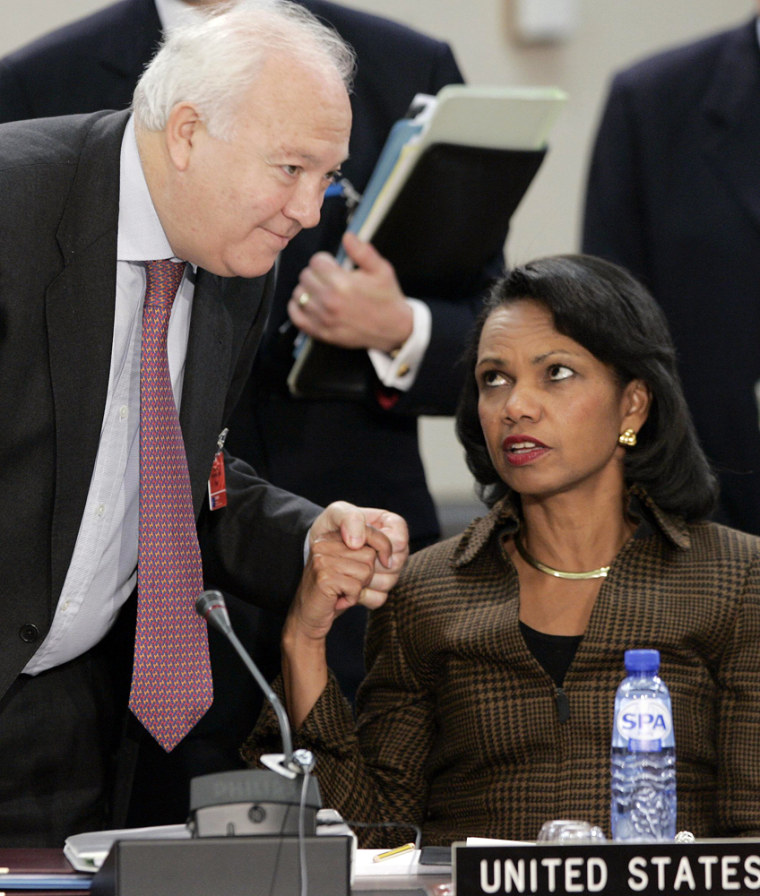Russia on Friday ignored Secretary of State Condoleezza Rice's calls for new U.N. sanctions to be imposed on Iran over its nuclear program.
Despite strong support from NATO allies in the wake of a new U.S. intelligence report that concludes Iran actually stopped atomic weapons development in 2003 but remains a threat, Rice was unable to persuade Russian Foreign Minister Sergey Lavrov on the urgency of fresh sanctions.
"It fully confirms the information that we have: that there is no military element in their nuclear program. We hope very much that these negotiations with Iran will continue," he told reporters after seeing Rice on the sidelines of a NATO ministerial meeting in Brussels.
Lavrov, who has become the public face of opposition to the U.S. and European strategy on Iran, has maintained Russia has no evidence that Tehran had ever had a secret nuclear weapons program in violation of international treaty obligations.
He did not discuss what Rice had told him.
U.S. intelligence turnaround
His comments were not unexpected given past Russian statements on the issue, but nevertheless dealt a setback to efforts to boost pressure on Iran to suspend uranium enrichment and reprocessing activities with a new U.N. Security Council sanctions resolution.
China, another key participant in the so-called "P5+1" group of world powers now trying to craft such a resolution, is also resisting. The P5+1 includes the five permanent members of the Security Council - Britain, China, France, Russia and the United States - plus Germany.
Apart from China and Russia, the others have endorsed upping pressure on Iran since the release on Monday of the new U.S. National Intelligence Estimate on Iran, which represented a surprising turnaround in Washington's assessment of Iranian intentions.
President Bush and Rice have argued that the report actually shows that Iran is susceptible to outside influence on its nuclear program because it finds that Tehran stopped its weaponization attempts four years ago in response to diplomatic pressure.
"It was international pressure that got the Iranians to halt their program," Rice said ahead of her talks with Lavrov. "This suggests that you ought to keep up that international pressure."
Her meetings in Belgium were her first face-to-face exchanges on the matter since the intelligence report became public.
Rice: Pressure worked
Rice saw Lavrov after having won NATO backing to stay the course on a two-pronged approach to Iran that offers the Islamic regime civilian nuclear cooperation in return for a shutdown of uranium enrichment and reprocessing.
"There was unanimity around the table that there is a clear choice for Iran," British Foreign Secretary David Miliband told reporters, noting offers of nuclear cooperation with Iran if it stops enriching and reprocessing uranium.
"Iran can see the outstretched hand from the international community if they are willing to join the drive against proliferation," he said. "But if Iran persists on defying the will of the United Nations Security Council, then there must be further sanctions."
But Lavrov said Wednesday that Moscow had never seen evidence of an Iranian nuclear weapons program, not even one that it had given up on four years ago. Rice had hoped to convince Lavrov that the new intelligence proved the value of tough diplomacy rather than undermining the drive to press for more sanctions.
“The point that I’m emphasizing to people is that it was international pressure that got the Iranians to halt their program,” Rice said.
“This suggests that you ought to keep up that international pressure,” she told reporters on her way to Belgium for her first face-to-face talks on the matter with foreign officials since the intelligence report became public.
The U.S. has been successful in leading two rounds of U.N. Security Council sanctions against Iran and is pushing for a third set of economic sanctions if the country refuses to suspend uranium enrichment.
In addition to her NATO meetings and session with Lavrov, Rice also saw Israeli Foreign Minister Tzipi Livni in Brussels.
Israel believes Iran is still working aggressively to build nuclear arms, despite the new U.S. conclusions and a senior Israeli defense official said Friday the Jewish state supported diplomacy but suggested it would still consider a military strike against Iran.
The Islamic regime in Tehran strongly opposes Israel's existence and frequently boasts of its ability to strike the Jewish state with long-range missiles.
Bush administration officials had worried that the findings of the new intelligence estimate could hurt their efforts to impose more sanctions on Iran to increase pressure for it to cease uranium enrichment and reprocessing, which could produce the ingredients for a bomb.
